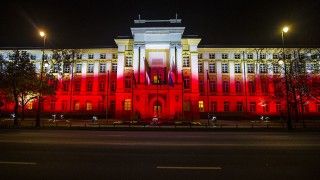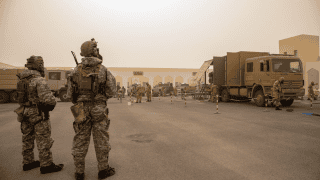- WIADOMOŚCI
Cameron Visits Warsaw. “We are willing to expand the NATO Eastern Flank”
British Prime Minister, David Cameron, during his diplomatic visit to Warsaw, met the Polish PM Beata Szydło. During the talks, the British PM declared that his country is willing to defend and expand the Eastern flank of the North Atlantic Treaty Organization.
During the meeting of the Polish and British Prime Ministers, Cameron, in his statement made in front of the media, stated that Great Britain is willing both to defend, as well as expand the NATO Eastern Flank. British PM recalled the fact that the RAF is deeply involved in the Baltic Air Policing operation. British Forces are also actively engaged in training initiatives that are also being organized in Poland.
British PM also said that Great Britain is willing to do more, since the United Kingdom is one of the first countries that became a part of the NATO Quick Reaction Forces and that takes care of the NATO presence, within the Eastern Flank of the alliance. Cameron, during his statement, also reminisced the Polish soldiers fighting against fascism. He also stressed the role of Poland within the process of tearing down the communist regime, restoring freedom in Europe. The journalists were also informed that the Russian invasion against Ukraine was one of the areas covered during the talks, along with the need to create resistance against propaganda created by Moscow.
Let us recall the fact that Great Britain, when reacting to the Ukrainian Crisis, sent a heavy battalion battle group to Poland. The element was equipped with heavy vehicles, including the Challenger 2 main battle tanks. The British proposal regarding the deployment has been revealed between May and June last year, a few weeks after Angela Merkel announced that she is an opponent of increased defence expenditure. On the other hand, the statement has been made before the Malaysian airliner was shot down, and before the Donbas crisis was intensified. Exercise, involving the battalion battle group, also took place this year.
Defence Committee of the British Parliament also stated that the Russian aggression constitutes an “alert” for the NATO alliance. London, thus, has shown the most decisive reaction, among the major players in Europe. In case of France or Germany, policy against Russia became more strict only after the MH17 airliner was shot down and after regular Russian forces entered the Donbas area, in August 2014. In October this year, on the other hand, London declared that the United Kingdom is going to maintain permanent rotational presence of the British military units in the East-Central Europe.
















